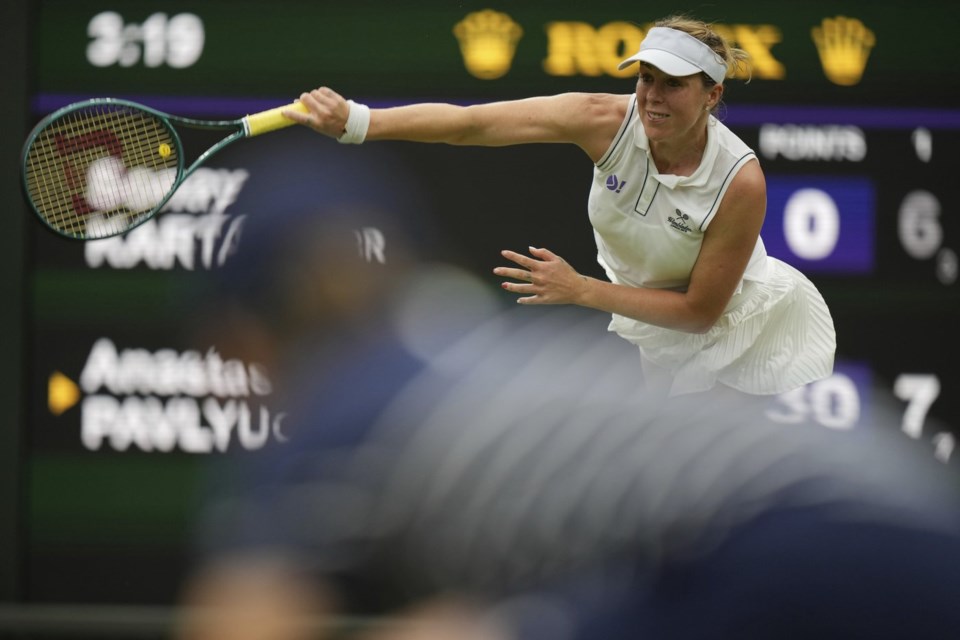LONDON (AP) — A ball that clearly landed long in a match at Centre Court wasn't called out Sunday because the electronic system that replaced line judges at Wimbledon this year accidentally was shut off for three points.
And, because the replay review procedure that used to be in place also has been scrapped, the chair umpire called for a do-over on the point at 4-all in the first set — much to the dismay of Anastasia Pavlyuchenkova, the player who would have won the game if the proper call had been made originally.
Pavlyuchenkova wound up getting broken there to trail Sonay Kartal of Britain, but she eventually did manage to come back to win the match 7-6 (3), 6-4 and reach the quarterfinals at the All England Club for the first time since 2016.
“You took the game away from me,” 2021 French Open runner-up Pavlyuchenkova told chair umpire Nico Helwerth at the changeover after the game ended.
Pavlyuchenkova, who is Russian, also said in the moment that the decision-making there went in Kartal's favor because she is a local player.
Next for Pavlyuchenkova is a match against No. 13 Amanda Anisimova of the United States, a 6-2, 5-7, 6-4 winner against No. 30 Linda Noskova on Sunday night. Anisimova also was a Wimbledon quarterfinalist in 2022; her best Slam showing was making the 2019 French Open semifinals at age 17.
At her news conference, Pavlyuchenkova said Helwerth told her following the match that he did think Kartal's shot landed out.
“I think he felt bad, a little bit,” Pavlyuchenkova said. “He probably felt like he should have taken the initiative and called it out.”
Pavlyuchenkova also said Helwerth “probably was scared to take such a big decision.”
Pavlyuchenkova was serving and had a game point when Kartal hit a backhand that landed beyond the opposite baseline, TV replays showed. But there was no sound of one of the recorded voices being used for the first time at Wimbledon to reflect when the technology being used in place of human officials determines that a ball landed out.
At least Pavlyuchenkova could joke about the whole episode later. Asked how she’d feel about it had she lost the match, Pavlyuchenkova responded with a laugh: “I would just say that I hate Wimbledon and never come back.”
She also cracked that chair umpires are “very good at giving fines and code violations” and never miss those, but perhaps it would be beneficial if they did a better job of noticing mistaken calls.
Kartal said she couldn't see where her shot went.
“That situation is a rarity. I don’t think it’s really ever happened — if it has. It’s tough. What can you do? The umpire’s trying his best in that situation, and he handled it fine,” Kartal said. “I think the system just malfunctioned a little bit, and the fairest way was what he did: replay the point.”
Helwerth delayed play while he made a phone call from his stand. Eventually, play resumed, Pavlyuchenkova missed a forehand on the replay, then lost the game a few points later.
The tournament looked into it afterward and blamed “human error,” saying that the line-calling setup “was deactivated in error on part of the server’s side of the court for one game by those operating the system,” according to an All England Club spokesperson, who added: “We continue to have full confidence in the accuracy of the ball-tracking technology.”
The spokesperson also said Pavlyuchenkova and Kartal received apologies from the club.
The French Open is now the only Grand Slam tournament that still uses line judges instead of electronic calls.
From 2007 through last year, players were allowed to challenge in-or-out calls at Wimbledon; a video review was employed to decide whether a line judge's — or chair umpire's — ruling was correct. That challenge system was removed for the current tournament, but there immediately were demands on social media from some tennis fans or observers to bring that back to aid chair umpires.
Pavlyuchenkova agreed, saying: “We should probably look into something else to have better decisions.”
Taylor Fritz, who reached the quarterfinals with a win at a different court Sunday, didn't see what happened. But when it was explained by a reporter, his biggest question was why the chair umpire didn't just make the call himself if it was so clear what actually happened on Kartal's shot.
“The chair umpire has to make the call,” 2024 U.S. Open finalist Fritz said. “Why is he there if he’s not going to call the ball?”
___
More AP tennis: https://apnews.com/hub/tennis
Howard Fendrich, The Associated Press



